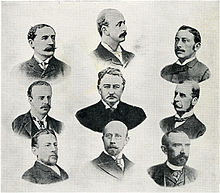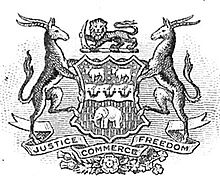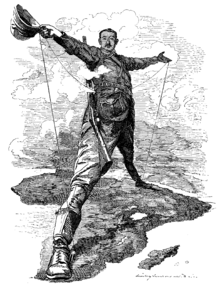- British South Africa Company
-
British South Africa Company 

Company logo and flagFormer type Public Industry Mining, Colonial enterprises Fate Acquired Predecessor Central Search Association and the Exploring Company Ltd. Successor Charter Consolidated Ltd Founded London, United Kingdom (1889) Founder(s) Cecil Rhodes Defunct 1965 Headquarters London, United Kingdom Area served Southern Africa
South Africa
Botswana
Rhodesia
Zambia
and their predecessor entitiesKey people Cecil Rhodes (Founder) The British South Africa Company (BSAC or BSACo) was established by Cecil Rhodes through the amalgamation of the Central Search Association and the Exploring Company Ltd., receiving a royal charter in 1889. Modelling the BSAC on the British East India Company, Rhodes hoped it would enable colonisation and economic exploitation across much of south-central Africa, as part of the "Scramble for Africa". The company's directors included the Duke of Abercorn, Rhodes himself and the financier Alfred Beit.
Contents
Trading
 The first board of directors of the British South Africa Company, 1889. Top Row: Horace Farquhar, Esq.; Albert Grey, Esq.; Alfred Beit, Esq. Middle Row: His Grace the Duke of Fife, K.T., P.C.; Hon. C. J. Rhodes (Founder and Managing Director in South Africa); His Grace the Duke of Abercorn, K.G., P.C. Bottom Row: Lord Gifford, V.C.; Herbert Canning, Esq. (Secretary); George Cawston, Esq.
The first board of directors of the British South Africa Company, 1889. Top Row: Horace Farquhar, Esq.; Albert Grey, Esq.; Alfred Beit, Esq. Middle Row: His Grace the Duke of Fife, K.T., P.C.; Hon. C. J. Rhodes (Founder and Managing Director in South Africa); His Grace the Duke of Abercorn, K.G., P.C. Bottom Row: Lord Gifford, V.C.; Herbert Canning, Esq. (Secretary); George Cawston, Esq.
The company was empowered to trade with African rulers such as King Lobengula; to form banks; to own, manage and grant or distribute land, and to raise a police force (the British South Africa Police). In return, the company agreed to develop the territory it controlled, to respect existing African laws, to allow free trade within its territory and to respect all religions. However, Rhodes and the white settlers attracted to the company's territory set their sights for ever more mineral rights and more territorial concessions from the African peoples, establishing their own governments, and introducing laws with little concern or respect for African law.
Security
The company recruited its own army, which allowed it to defeat and replace the Matabele kingdom and then overcome resistance of the Shona north of the Limpopo river in the First Matabele War and Second Matabele War. It was the first British use of the Maxim gun in combat (causing five thousand Ndebele casualties). The company carved out and administered a territory which it named Zambezia, and later, Rhodesia, and which now covers the area occupied by the republics of Zambia and Zimbabwe.
Medal
For more details on this topic, see British South Africa Company Medal.In 1896, Queen Victoria sanctioned the issue by the British South Africa Company of a medal to troops who had been engaged in the First Matabele War. In 1897, the Queen sanctioned another medal for those engaged in the two campaigns of the Second Matabele War: Rhodesia (1896) and Mashonaland (1897). The government of Southern Rhodesia re-issued the medal to commemorate the earlier 1890 Pioneer Column, in 1927.
Politics
In 1914, the royal charter was renewed, on condition that settlers in Rhodesia were given increased political rights. In 1922, the company entered negotiations with the government of the Union of South Africa, which was keen to incorporate Southern Rhodesia - a plan foiled by the colony's settlers, who voted in favour of self-government.
In 1923, the British government chose not to renew the Company's charter, and instead accorded 'self-governing' colony status to Southern Rhodesia (present day Zimbabwe) and protectorate status to Northern Rhodesia (present day Zambia).
Profits
The BSAC was not able to generate enough profit to pay its shareholders dividends until after it lost direct administrative control over Rhodesia in 1923. In 1933, the BSAC sold its mineral exploration rights south of the Zambezi to the Southern Rhodesian government, but retained rights over Northern Rhodesian mineral rights, as well as the company's vast interests in mining, railways, real estate and agriculture across southern Africa.
Merger
In 1964, the company was forced to hand over its mineral rights to the government of Zambia, and the following year, the British South Africa Company merged with the Central Mining & Investment Corporation Ltd and The Consolidated Mines Selection Company Ltd to form a mining and industrial company known as Charter Consolidated Ltd, of which slightly over one-third of the shares were owned by the British/South African mining company Anglo American plc.
References
- Rasmussen, R. K., & Rubert, S. C., 1990. A Historical Dictionary of Zimbabwe, Scarecrow Press, Inc., Metuchen, NJ, United States of America.
- Scouting on Two Continents, by Major Frederick Russell Burnham, D.S.O. LC call number: DT775 .B8 1926. (1926)
"Blue & Old Gold - The History of the British South Africa Police 1889-1890" published September 2009 http://www.30degreessouth.co.za
See also
- Baron Robins
- Cecil Rhodes
- Chartered companies
- Cape to Cairo
- Cape to Cairo Railway
- Cape to Cairo Red Line
- Cape to Cairo Road
- Henry Birchenough
- Pioneer Column
- Shangani Patrol
- "Blue & Old Gold - The History of the British South Africa Police 1889-1890" http://www.youtube.com/watch?v=0Sqrk8yn9r4
Categories:- Rhodesia
- History of South Africa
- British Empire
- Companies established in 1889
- Companies disestablished in 1965
- Chartered companies
Wikimedia Foundation. 2010.


